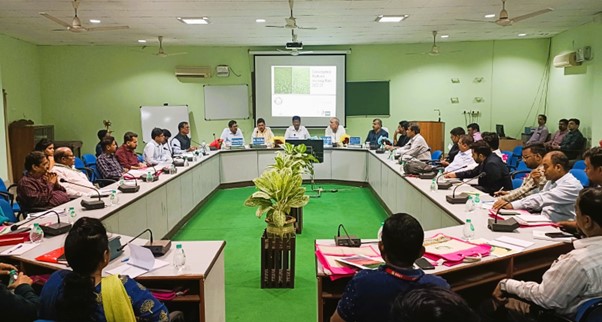Convergence Platform (Odisha) Meeting
On 15 December 2022, ICAR-Agricultural Technology Application Research Institute, Kolkata (ICAR-ATARI) convened a “Convergence Platform Odisha Meeting” at the Directorate of Extension Education, OUAT, Bhubaneswar. It was facilitated by Cereal Systems Initiative for South Asia (CSISA) and participated by different stakeholders engaged in the state agriculture sector. This event was the first Convergence Platform (CP) meeting of all stakeholders (almost all actors in the agri-development and agri-bussiness sector) since the CP initiative was formalised in Odisha by CSISA and partners.
As many as 75 participants from various stakeholder groups like the Department of Agriculture and Farmers Empowerment (DAFE), Govt. of Odisha, Odisha University of Agriculture and Technology (OUAT), Krishi Vigyan Kendras (KVKs), Institute on Management of Agricultural Extension (IMAGE), ICAR-Agricultural Technology Application Research Institute, Kolkata (ICAR-ATARI), IRRI-GoO-DSR-Odisha and CSISA project, Bayer CropScience, Reliance Foundation, agri-machinary manufacturers and dealers, NGOs, progressive farmers, and agriculture service providers attended in the meeting.
In this state-level meeting, Prof. P. K. Roul, Vice Chancellor, OUAT was the Chief Guest, and Shri Anshuman Patnaik, Additional Director Extension, DAFP, Govt. of Odisha, was the guest of honour. Dr. R.K Malik and Dr. Ashok Kumar representing IRRI-GoO-DSR-Odisha & CSISA Project, and Prof. P.J. Mishra, Dean of Extension Education, OUAT, Bhubaneswar, participated in the meeting. Dr. S.K. Roy, Director, ICAR- ATARI, Kolkata, served the role of convener.
The meeting was conducted over two sessions, inaugural and technical. In the inaugural session, Dr. S.K. Roy welcomed the participants and shared some of the outputs of the KVK-CSISA collaboration that could add value to the convergence platform. He said, “identifying today’s top priorities in agriculture and then CP working on those to address the issues together is the broad objective of the convergence platform”.
Dr. Malik explained the implementation strategies and the CP’s structure (who, the frequency, and function) at the district, state, and country levels. “To build consensus, coming together through the CP and releasing common messages/advisories to the end users is important,” he said. This, according to him, is one of the important outcomes of CP. Based on LDS work done through the KVK-CSISA network, Dr. R.K. Malik also gave a presentation on “Lessons from landscape diagnostic survey (LDS) in rice”.
The Vice Chancellor, OUAT Prof. Roul endorsed the LDS findings. During the discussion, he mentioned that Odisha’s existing seeding machines are not that precise. They are brought from the west (of a different landscape and ecology), but good quality machines are now manufactured in north India. So, this needs rethinking in the Odisha context, he said.
Based on discussions during the meeting, a consensus was developed to conduct a joint demonstration during the next Kharif season in the project area on several DSR aspects.
Dr. Ashok Kumar (coordinator DSR-Odisha/CSISA project) presented the KVK-CSISA and DSR-Odisha project activities and outcomes. Dr. Ashok highlighted the major findings of CSISA during its last three phases (2012-2022) and the DSR-Odisha project’s progress. “The progress, so far, under DSR-Odisha/CSISA project is more than targeted/mandated and highly encouraging. He emphasized that the project introduced the best seeding machines, mechanical weeders, and power sprayers favorable to Odisha landscapes and that such machines must come into the supply chain.”
Shri Anshuman Patnaik shared the government priorities in agriculture and present facilities for the development of Odisha agriculture. He agreed that such initiatives through ATARI_ICAR, OUAT, and CSISA is the need of time. He endorsed the systematic approaches to developing technical and social aspects for scaling.
Prof. P. K. Roul, in his closing remarks, encouraged undertaking such initiatives in Odisha. He said, “It is high time to engage the agri-business players, and I am delighted to see their participation in this CP meeting”. Highlighting the growing importance of “Aggregation-Business-Convergence (A-B-C concept)” in agriculture nowadays, Prof. Roul congratulated the organizers for developing a similar structure of CP by engaging the relevant stakeholders. “The DSR-Odisha Project is a new episode (innovation and partnership) in Odisha Agriculture,” he said.
Prof. P.J. Mishra concluded the inaugural session and congratulated everyone for participating and contributing to the ongoing CP initiative. The second session on the technical discussion was led by Dr. Ashok, who started the meeting by sharing the learnings and scientific findings to date generated from the joint demonstrations and adaptive trials of CSISA/DSR Odisha project-KVKs in Odisha. Some of the key discussions were as follows:
- All stakeholders agreed to share common messages on pulses and oilseed cultivation. CSISA team will support the message draft – CSISA has shared the same for further communication through CP.
- A consensus on improving farm mechanization in Odisha had everyone in agreement. Shri Patnaik informally invited manufacturers, dealers, NGOs, and farmers to showcase their products at the state farmers’ fair (February 2023).
- Two progressive farmers from Odisha – Mr. Dillip Boral of Resinga village and Mr. Manoranjan, Taraboi of in village – raised the issue of timely availability of quality seeds. They said, “Even if through demonstration farmers can know the high-performing varieties, those seeds, in particular, are not available for use. So, seed production of these crops (both formal and informal) must be given due importance”.
- KVKs in the state were welcomed by the CSISA/DSR-Odisha project to propose demonstrations at KVK- Farms or adapted villages, which can serve as a showcase for farmers in their districts.
- On crop diversification, the house discussed that besides pulses, oilseed and maize, millets like Pearl millet and Sorghum should also be targeted for their feasibility evaluation during the kharif season in the rainfed rice ecologies of Odisha.
- Since ATARI, Kolkata is playing a major role in zonal KVK-CSISA collaborative activities, the supply of multi-crop planters to KVKs by ATARI may also be considered for immediate execution of demos/ATs/scaling activities as per needs.

